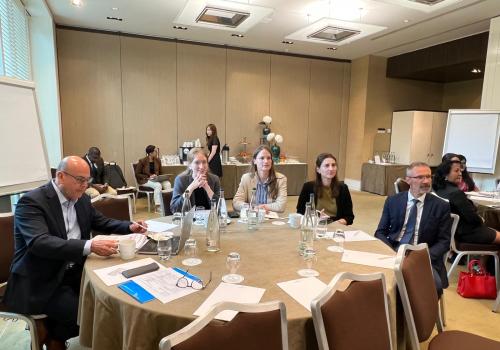As part of ongoing efforts to build resilience to climate change and enhance disaster risk management, the Southern African Development Community (SADC) Secretariat held two engagements with the German Federal Ministry for Economic Cooperation and Development (BMZ) and its implementing agency, the Deutsche Gesellschaft für Internationale Zusammenarbeit (GIZ) GmbH, on 3rd and 4th June 2025 in Geneva, Switzerland. These discussions were convened on the margins of the Global Platform for Disaster Risk Reduction, taking place from 2nd – 6th June 2025.
The engagements focused on reviewing progress in the implementation of two flagship initiatives - the Global Initiative on Disaster Risk Management (GIDRM) and the Resilience Initiative for Africa (RIA)which are key components of SADC’s DRR agenda and supported by the GIZ. These initiatives promote risk-informed development and regional integration through mainstreaming disaster risk management across the SADC region.
SADC and BMZ had interactive strategic and programmatic discussions on the GIZ portfolio with SADC Secretariat.
Dr. Martin Schuldes, Head of Division for Peace and Security at BMZ, applauded the Secretariat for the sustained commitment to the partnership with the German Government. He emphasised the mutual benefits of the cooperation, which have contributed to saving lives and enhancing the well-being of populations in the SADC region and the world at large. Dr. Schuldes highlighted the importance of collaborative efforts, underscoring the need for increased investment in disaster prevention and the integration of risk awareness at all stages of development planning.
He reiterated that evidence generation is a crucial condition for risk-informed policies which are foundational for sustainable development. Dr. Schuldes also issued a compelling call to action, stressing the urgency of integrating risk considerations into development processes.
Ms. Nana Dlamini, Acting Head of Disaster Risk Reduction Unit at the SADC Secretariat, provided an update on the implementation of the disaster risk programmes in the SADC region, particularly by focusing on the GIDRM and RIA projects. She highlighted the tangible benefits realised through GIZ’s support, particularly in strengthening disaster preparedness and the considerations of risk-informed development approaches in the urban, water, natural resources management and agriculture sectors in the region. She expressed gratitude for the continued partnership and investment that are significantly contributing to regional risk-informed development and its integration.
An example of this, is the rollout and sectoral capacity building on the use and maintenance of the INFORMRisk subnational index, implemented jointly between GIZ, UNDP and the SADC Secretariat.
In addition to the above mentioned engagements, discussions focused on the follow-up phase of the RIA programme, as it nears its completion in June 2026. Aligned to the Africa Programme of Action and the Sendai Framework for Disaster Risk Reduction and the Africa Common Position on DRR, particular focus was on: advancing urban resilience; enhancing evidence generation for disaster risk management; and operationalising existing guidelines on mainstreaming DRM into sectors, including those focused on urban resilience.
Mr. Marcus Oxley, founder of Resilience Solutions, provided a comprehensive overview of the risk-informed development agenda. He acknowledged progress made in early warning systems and emergency response mechanisms, which have significantly reduced disaster-related fatalities. However, he warned of the escalating socio-economic costs of disasters, underlining that these have now resulted in estimated annual losses of USD 2.3 trillion, equivalent to 2% of global GDP, amounting to USD 200 billion in humanitarian assistance. Mr. Oxley called on the global community to halt the creation of new risks and to foster a culture of risk governance that protects developmental gains and promotes systematic resilience by also considering the risks from developmental decisions.
Both BMZ and SADC representatives agreed on the relevance of raising the aspect of DRR into the upcoming governmental negotiations between the German Government and the SADC Secretariat.
Links:

